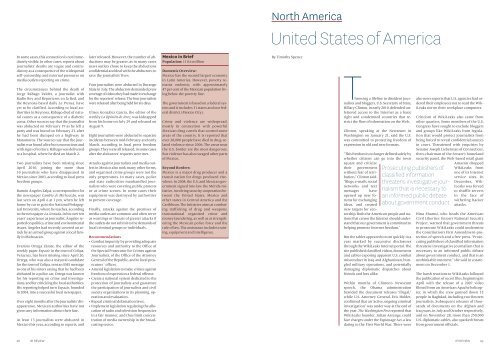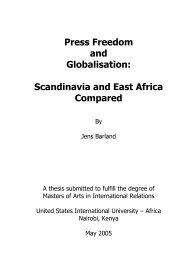FOCUS ON THE AMERICAS - International Press Institute
FOCUS ON THE AMERICAS - International Press Institute
FOCUS ON THE AMERICAS - International Press Institute
You also want an ePaper? Increase the reach of your titles
YUMPU automatically turns print PDFs into web optimized ePapers that Google loves.
In some cases, this connection is not immediately<br />
visible. In other cases, reports about<br />
journalists’ deaths are vague and contradictory<br />
as a consequence of the widespread<br />
self-censorship and external pressures on<br />
media outlets reporting on crime.<br />
The circumstances behind the death of<br />
Jorge Rábago Valdez, a journalist with<br />
Radio Rey and Reporteros en la Red, and<br />
the Reynosa-based daily La Prensa, have<br />
yet to be clarified. According to local authorities<br />
in Reynosa, Rábago died of natural<br />
causes as a consequence of a diabetic<br />
coma. Other sources say that the journalist<br />
was abducted on February 19 as he left a<br />
party and was found on February 23, after<br />
he had been dumped on a highway in<br />
Matamoros. The sources say that the journalist<br />
was found alive but unconscious and<br />
with signs of torture. Rábago was delivered<br />
to a hospital, where he died on March 2.<br />
Two journalists have been missing since<br />
April 2010, joining the more than<br />
10 journalists who have disappeared in<br />
Mexico since 2003, according to local press<br />
freedom groups.<br />
Ramón Ángeles Zalpa, a correspondent for<br />
the newspaper Cambio de Michoacán, was<br />
last seen on April 6 at 1 pm, when he left<br />
home by car to go to the National Pedagogical<br />
University, where he teaches, according<br />
to the newspaper La Jornada. In his over ten<br />
years’ experience as journalist, Ángeles reported<br />
on politics, crime and environmental<br />
issues. Ángeles had recently covered an attack<br />
by an armed group against a local family<br />
in Michoacán.<br />
Evaristo Ortega Zárate, the editor of the<br />
weekly paper Espacio in the town of Colipa,<br />
Veracruz, has been missing since April 20.<br />
Ortega, who was also a mayoral candidate<br />
for the town of Colipa, sent an SMS message<br />
to one of his sisters saying that he had been<br />
abducted in a police car. Ortega was known<br />
for his reporting on crime and investigations,<br />
and for criticizing the local authorities.<br />
His reporting helped turn Espacio, founded<br />
in 2004, into a successful local newspaper.<br />
Over eight months after the journalists’ disappearance,<br />
Mexican authorities have not<br />
given any information about their fate.<br />
At least 13 journalists were abducted in<br />
Mexico this year, according to reports, and<br />
28 IPI REVIEW<br />
later released. However, the number of abductions<br />
may be greater, as in many cases<br />
news outlets chose to keep the abductions<br />
confidential and deal with the abductors, to<br />
save the journalists’ lives.<br />
Four journalists were abducted in Durango<br />
State in July. The abductors demanded press<br />
coverage of videos they had made in exchange<br />
for the reporters' release. The four journalists<br />
were released after being held for six days.<br />
Ulises González García, the editor of the<br />
weekly La Opinión de Jérez, was kidnapped<br />
from his home on July 29 and released on<br />
August 9.<br />
Eight journalists were abducted in separate<br />
incidents between mid-February and early<br />
March, according to local press freedom<br />
groups. They were all released, in some cases<br />
after the abductors’ requests were met.<br />
Attacks against journalists and media outlets<br />
in Mexico also took many other forms,<br />
and organized crime groups were not the<br />
only perpetrators. In many cases, police<br />
and state authorities manhandled journalists<br />
who were covering public protests<br />
or at crime scenes. In some cases their<br />
equipment was destroyed by authorities<br />
to prevent coverage.<br />
Finally, attacks against the premises of<br />
media outlets are common and often serve<br />
as warnings or threats of greater attacks if<br />
the outlets do not submit to the demands of<br />
local criminal groups or individuals.<br />
Recommendations<br />
• Combat impunity by providing adequate<br />
resources and authority to the Office of<br />
the Special Prosecutor for Crimes against<br />
Journalists, of the Office of the Attorney<br />
General of the Republic, and to local prosecutors´<br />
offices.<br />
• Amend legislation to make crimes against<br />
freedom of expression a federal offense.<br />
• Create a national system dedicated to the<br />
protection of journalists and guarantee<br />
the participation of journalists and civil<br />
society organizations in its planning, operation<br />
and evaluation.<br />
• Repeal criminal defamation laws.<br />
• Implement legislation regulating the allocation<br />
of radio and television frequencies<br />
in a fair manner, and thus limit concentration<br />
of media ownership in the broadcasting<br />
sector.<br />
Mexico in Brief<br />
Population: 110.6 million<br />
Domestic Overview:<br />
Mexico has the second largest economy<br />
in Latin America. However, poverty remains<br />
endemic, with approximately<br />
47 per cent of the Mexican population living<br />
below the poverty line.<br />
The government is based on a federal system<br />
and it includes 31 states and one federal<br />
district (Mexico City).<br />
Crime and violence are widespread,<br />
mostly in connection with powerful<br />
Mexican drug cartels that control some<br />
areas of the country. It is reported that<br />
over 28,000 people have died in drug-related<br />
violence since 2006. The areas near<br />
the U.S. border are the most dangerous.<br />
But violence has also ravaged other parts<br />
of Mexico.<br />
Beyond Borders:<br />
Mexico is a major drug producer and a<br />
transit nation for drugs produced elsewhere.<br />
In 2008, the U.S. and Mexican government<br />
signed into law the Mérida Initiative,<br />
involving security cooperation between<br />
the United States, Mexico and<br />
other states in Central America and the<br />
Caribbean. The Initiative aims at combating<br />
trafficking of drug and weapons,<br />
transnational organized crime and<br />
money laundering, as well as at strengthening<br />
the Mexican police force and the<br />
rule of law. The assistance includes training,<br />
equipment and intelligence.<br />
North America<br />
United States of America<br />
By Timothy Spence<br />
Throwing a lifeline to dissident journalists<br />
and bloggers, U.S. Secretary of State,<br />
Hillary Clinton, in early 2010, defended unfettered<br />
access to the Internet as a basic<br />
right and condemned countries that restrict<br />
the flow of information on the Web.<br />
Clinton, speaking at the Newseum in<br />
Washington on January 21, said the U.S.<br />
was committed to protecting freedom of<br />
expression in old and new formats.<br />
“This freedom is no longer defined solely by<br />
whether citizens can go into the town<br />
square and criticize<br />
their government<br />
without fear of retribution,”<br />
Clinton said.<br />
“Blogs, e-mails, social<br />
networks and text<br />
messages have<br />
opened up new forums<br />
for exchanging<br />
ideas, and created<br />
new targets for censorship.<br />
Both the American people and nations<br />
that censor the Internet should understand<br />
that our government is committed to<br />
helping promote Internet freedom.”<br />
But the tables appeared to turn quickly in a<br />
year marked by successive disclosures<br />
through the WikiLeaks Internet portal. The<br />
site published classified videos, documents<br />
and cables exposing apparent U.S. combat<br />
misconduct in Iraq and Afghanistan, bungled<br />
military operations, and potentially<br />
damaging diplomatic dispatches about<br />
friends and foes alike.<br />
Within months of Clinton’s Newseum<br />
speech, the Obama administration<br />
branded the document releases “illegal,”<br />
while U.S. Attorney General, Eric Holder,<br />
confirmed that an “active, ongoing criminal<br />
investigation” was under way at the end of<br />
the year. The Washington Post reported that<br />
WikiLeaks founder, Julian Assange, could<br />
face charges under the Espionage Act, a law<br />
dating to the First World War. There were<br />
also news reports that U.S. agencies had ordered<br />
their employees not to read the WikiLeaks<br />
site on their workplace computers.<br />
Criticism of WikiLeaks also came from<br />
other quarters. Some members of the U.S.<br />
Congress have sought to exclude bloggers<br />
and groups like WikiLeaks from legislation<br />
that would protect journalists from<br />
being forced to reveal confidential sources<br />
in court. Threatened with enquiries by<br />
Senator Joseph Lieberman of Connecticut,<br />
then-chairman of the Senate’s homeland<br />
security panel, the Web-based retail giant<br />
Amazon dropped<br />
Prosecuting publishers of<br />
classified information<br />
threatens investigative journalism<br />
that is necessary to<br />
an informed public debate<br />
about government conduct.<br />
WikiLeaks from<br />
one of its Internet<br />
service sites. In<br />
December, WikiLeaks<br />
was forced<br />
to shuffle servers<br />
in the face of<br />
withering hacker<br />
attacks.<br />
Hina Shamsi, who heads the American<br />
Civil Liberties Union’s National Security<br />
Project, warned that government threats<br />
to prosecute WikiLeaks could undermine<br />
the Constitution’s First Amendment-protection<br />
of speech and a free press. “Prosecuting<br />
publishers of classified information<br />
threatens investigative journalism that is<br />
necessary to an informed public debate<br />
about government conduct, and that is an<br />
unthinkable outcome,” she said in a statement<br />
on December 1.<br />
The harsh reactions to WikiLeaks followed<br />
the publication of secret files, beginning in<br />
April with the release of a 2007 video<br />
filmed from an American Apache helicopter,<br />
in which the crew gunned down 12<br />
people in Baghdad, including two Reuters<br />
journalists. Subsequent releases of thousands<br />
of documents on the Afghan and<br />
Iraq wars, in July and October respectively,<br />
and on November 28, more than 250,000<br />
U.S. diplomatic cables, also sparked threats<br />
from government officials.<br />
IPI REVIEW<br />
29

















